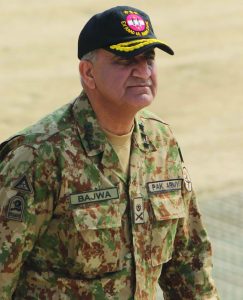 An Angry Chief Justice of Pakistan, Asif Saeed Khosa, observed in an open court proceeding that he and the other members of the bench — Justices Mazhar Alam Khan Miankhel and Syed Mansoor Ali Shah — were accused of being the CIA agents and working on an Indian agenda to weaken Pakistan. In a clear message to the Army and ISI, the unquestioned self-serving power mafia of the Islamic State of Pakistan, that this unprecedented propaganda unleashed against the judges, would not deter them to rein in even the army and its secret services under a framework of law. Justice Khosa also stated that the maligning of the apex court had begun on November 26, 2019, the moment the court stayed the three-year extension of the present incumbent Army Chief Qamar Javed Bajwa and began hearing on the issue of his extension.
An Angry Chief Justice of Pakistan, Asif Saeed Khosa, observed in an open court proceeding that he and the other members of the bench — Justices Mazhar Alam Khan Miankhel and Syed Mansoor Ali Shah — were accused of being the CIA agents and working on an Indian agenda to weaken Pakistan. In a clear message to the Army and ISI, the unquestioned self-serving power mafia of the Islamic State of Pakistan, that this unprecedented propaganda unleashed against the judges, would not deter them to rein in even the army and its secret services under a framework of law. Justice Khosa also stated that the maligning of the apex court had begun on November 26, 2019, the moment the court stayed the three-year extension of the present incumbent Army Chief Qamar Javed Bajwa and began hearing on the issue of his extension.
The Pakistani judiciary has always shown courage to challenge the dictatorship of the armed forces under the garb of an Islamic state. The army dictator, General Musharraf, who had sacked the civilian prime minister, Nawaz Sharif, and had grabbed power, had faced countrywide protest in 2007 demanding the reinstatement of Supreme Court Chief Justice Iftikhar Chaudhry. Choudhary was sacked by the dictator, but had refused to resign despite army commandos sent by Musharraf.
The history appears to have repeated in 2019, when the mentor of the present prime minister Imran Khan and his army sponsored political outfit, Pakistan Tehreek-e-Insaf (PTI). It means, the party stands for “Pakistan Movement for Justice”. General Bajwa had the intelligence department the Inter-services intelligence (ISI) had indulged in massive poll rigging the 2018 elections. Imran Khan in a hurry to repay Bajwa’s support issued a notification signed by him extending his tenure to next three years from the day, the general would superannuate i.e. November 29, 2019.
It is often said that history repeats, in Pakistan, the judiciary has again challenged the illogical methods of the power game the military establishment plays in the name of Islam. Choudhary had upset the decade-old impression that the judiciary is a pet institution of the army and its generals, but Khosa and his colleagues have ushered in an era of fair play in the administration.
With the judicial scrutiny of Bajwa’s extension issue, many predicted that it may kick off civil-military conflict, but the apex court has taken a very broad-spectrum view on the issue fo the appointment of the army chief in the country, which has already been under the military dictatorship of the most of the years since its inception in 1947. Also the civilian rules too could not survive without the blessing of the army headquarters known as the GHQ.
The court verdict on Thursday, November 28, 2019, is a major blow to Prime Minister Imran Khan personally, and the Pakistani army known for its assertive role in the country. It is also a case of acute embarrassment to Bajwa, who had ensured the victory of Imran Khan and his party. Khan has become a personal liability. There are also reports that before the court’s verdict Khan has already been told to put in papers. With Nawaz Sharif allowed to die in exile, it cannot be ruled out that Bilawal Bhutto may be the new favorite of the GHQ.
The apex court has given conditional extension of six months to Bajwa that too after seeking written undertaking from the government to draft an amended notification with the elimination of the mention of the Supreme Court, duration of the Army chief’s tenure, and the description of Army chief’s salary and incentives. The extension was given only after the written statement from the government that “legislation pertaining to the extension will be prepared within six months.” It also appears that the apex court’s order has given a life of at least six months to the crumbling government of Khan. The GHQ may allow him to stay in power till the constitution is amended for the appointment and extension of the army chief.
In an open court, Justice Khosa had quipped, “You are giving the incumbent chief a three-year extension, so what if a more capable military officer is on service? Would you grant him a thirty-year extension?”He also observed that propaganda was launched against the judges as we took up the matter. “It was said that the three judges are CIA agents and are working on Indian agenda.”
The previous extensions
At the outset of hearing on Thursday, the Chief Justice asked Attorney General Anwar Mansoor Khan to present the notifications regarding the extension in the tenure of former Army chief (retd) General Ashfaq Pervez Kayani and the retirement of (retd) General Raheel Sharif. He also quipped, “We were told yesterday that generals never retire.”
The attorney general informed the court that General Bajwa has been reappointed under Article 243, to which the CJP remarked that “you have to convince us this is legal.”After the arguments from the attorney general and Farogh Naseem, the bench stated that the court will announce the short order in the afternoon while the detailed verdict would be issued in the evening.
In the meantime, the court granted Bajwa permission to continue working, conditionally. It further instructed the government to prepare a fresh notification, which does not list the tenure of the extension and to submit it in the court in the afternoon. Thus the three-day drama of Bajwa’s extension for another three years was concluded on Thursday, November 28, just 24 hours before his superannuation with only six months extension.
It all began on November 26, 2019, when a petition on the extension of Bajwa was moved before the apex court by a little-known petitioner, Raiz Rahi, a lawyer, who had questioned the process of the extension given to the army chief. Justice Khosa ordered the suspension of the extension, and asked the army as well as the government to furnish the details and logic of the extension. The nervous petition wanted to withdraw his petition, but the court converted into public interest litigation under Article 184 of the Pakistani Constitution.
Court Room Observations
On the Wednesday’s hearing, the CJP observed, “the matter of the period of army chief’s tenure is very important. In the past, five or six generals have granted themselves extensions. We will look at this matter closely so that this does not happen in the future. This is an extremely important matter [and] the Constitution is quiet about this,” He further explained, “According to the law, during a war, the army chief can stop officers’ retirements, however, in this case the government wants to stop the army chief’s retirement.”
Justice Shah pointed out that Article 243 of the Constitution talks about the appointment of an officer and asked: “Does it mention the period of appointment as well? He further asked if a general can continue to work if his tenure is extended just two days before his retirement. “Where does it say that it is a three-year term (for an extension)?” he asked. The attorney general admitted that the period of the tenure is not specified in the rules. On this, Justice Khosa emphasized that the court was looking at the rules regarding the tenure of the army chief, not a general.
Minister QUITs to BACK Bajwa
Instead of devoting more attention to the facts and process, the Imran Khan and his team were seen in indulging in more drama than taking corrective measures. His law minister, Farogh Naseem, resigned on November 26 night and presented himself as a lawyer to defend General Bajwa before the apex court. The attorney general, Anwar Mansoor Khan, presented arguments on behalf of the government.
In the court room, a lively conversation was witnessed, when the attorney general stated, “the process was “nothing new” and “extensions were notified in the same manner in the past.” Justice Alam quipped, “In the past the court never stepped in to assess someone’s extension in tenure.”
The apex court also refused to accept the Khan government’s logic that the situation in Jammu and Kashmir and also the regional security environment requires that Bajwa should continue. “If the (regional security) situation is so then the army as a whole body can deal with the situation, not the individual,” Khosa said. “If this criteria is allowed than every individual in the army can demand an extension on the same grounds.” He regretted that the office of the prime minister has failed to follow procedure by submitting the extension request through the office of Pakistan’s president.
letters@tehelka.com












